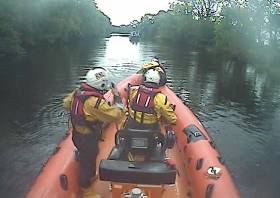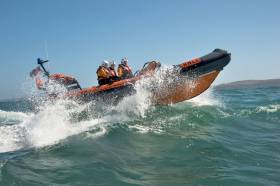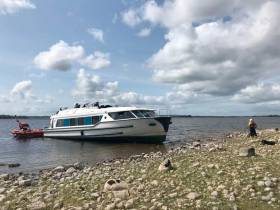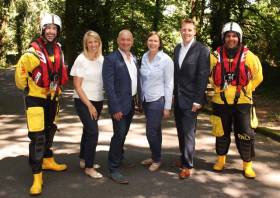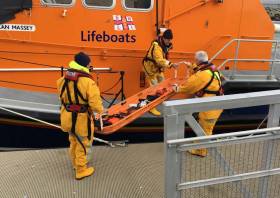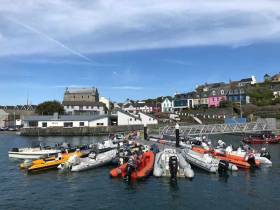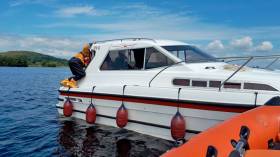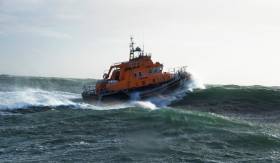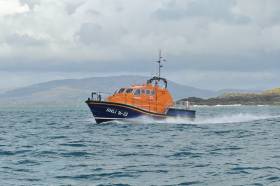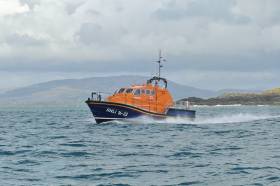Displaying items by tag: Baltimore
Busy Sunday For RNLI Lifeboats At Lough Derg, Baltimore & Portaferry
#RNLI - Lough Derg RNLI assisted four people after their boat ran aground when they took a wrong turn above Victoria Lock on the River Shannon yesterday (Sunday 9 September)
Water levels at the casualty vessel’s location were very low when the lifeboat arrived at 2.11pm, a little over an hour after launch.
All four on board the casualty boat were safe and unharmed. The skipper had dropped anchor as there was a strong flow, combined with wind, at the location.
While the vessel had sustained damage to its propellers and drive, its hull was not holed.
The lifeboat took the casualty vessel under tow back to the main navigation channel and onwards to Shamrock Marina at Banagher, the closest safe harbour and where the vessel had a mooring at which it was safely tied alongside at 4pm.
Peter Kennedy, deputy launching authority at Lough Derg Lifeboat Station, advises boat owners to carry up-to-date charts and to familiarise themselves with the buoyage on the Shannon.
Meanwhile, Baltimore RNLI launched their inshore lifeboat around 2.50pm to a sailing sloop that had filled with water near the West Cork harbour.
Within three minutes the inshore lifeboat reached the casualty boat, a 6m sailing vessel with two on board which had been caught up on pot buoys and knocked over by a strong gust.
Another RIB with a Baltimore lifeboat crew member was an ready on standby as the sailors bailed out their vessel, and after helping to speed up the process, they soon had the boat clear of water and ready to sail back to Baltimore Harbour unassisted.
Much earlier on Sunday, Portaferry RNLI were part of the multi-agency response to a Mayday call from a lone sailor on a 20m act grounded at Phennick Point near Ardglass in Co Down.
Due to the vessel’s position on dangerous rocks and with fishing gear in the area, only Portaferry’s inshore lifeboat was small enough to manoeuvre through the rocks and rough seas to retrieve the sailor and transfer him safety to Ardglass Marina.
Baltimore Lifeboat Launches To Speedboat With Engine Troubles
#RNLI - Baltimore RNLI was called out last night (Tuesday 4 September) to a speedboat with engine trouble near Bird Island in West Cork.
The volunteer lifeboat crew were on exercise in their inshore lifeboat when the request came in from the Irish Coast Guard at 7.55pm to assist the 17ft speedboat, with four people onboard and reporting to have engine trouble north of the island near Cape Clear.
The lifeboat, with three volunteer crew onboard — helm John Kearney, John McDonough and Colin Rochford — was already in the vicinity of Cape Clear when the call came in and reached the casualty vessel at 7.57pm.
Conditions at the time were calm with a northerly Force 2-3 wind and slight sea swell.
When the lifeboat crew arrived on scene, the speedboat was only 100m north of Bird Island and was drifting towards the shore in calm seas, but in an area known for its strong tides.
The lifeboat immediately secured a tow line to the bow of the speedboat and, after confirming all onboard were okay, they towed the vessel to Baltimore harbour.
In other news, Baltimore RNLI’s annual barbecue will be hosted by Derry and Sally Anne Clarke at Sherkin House on Sherkin Island from 1pm this Saturday 8 September. All are welcome and no booking is required.
Lough Ree Lifeboat Rescues Four From Boat Hard Aground
#RNLI - Lough Ree RNLI volunteers have rescued four people whose 37-foot boat had run hard aground on the Longford shore.
At 12.17pm yesterday afternoon (Wednesday 29 August) the Irish Coast Guard in Malin Head tasked the Lough Ree inshore lifeboat to the north of Priest Island, at the north of Lough Ree.
Once on scene, the crew members found a boat in deep water at the stern while the bow was out of the water.
Having checked that all onboard were uninjured and that the boat was undamaged, the lifeboat crew attempted to tow the boat into deeper water. Unfortunately they were unable to do so.
Lifeboat helm Stan Bradbury spoke directly to the boat hire company involved, who were sending further assistance.
Speaking after the callout, Bradbury said: “It’s important to remain aware of your surrounds when out on the lake and how close to the shore you may be.
“We would also like to extend our thanks to the lady who contacted the coastguard and remained on scene until our volunteers arrived.”
Elsewhere, Baltimore RNLI was called out to a fishing vessel in difficulty south of Kedge Island.
The eight-metre fishing boat, with two people onboard, had become propped on discarded netting three miles off the island near Baltimore in West Cork.
The lifeboat established a tow and brought the vessel back to Baltimore Harbour, arriving just over an hour after the call came in.
“Today’s call highlights one of the hazards of materials being discarded at sea,” said Baltimore RNLI press officer Kate Callanan.
Cork Lifeboat Lunch Returns To Raise Vital Funds For The RNLI
#RNLI - The hugely successful Cork RNLI charity lunch and auction is set to return after an absence of five years.
The revamped fundraiser for Baltimore, Crosshaven and Kinsale’s RNLI lifeboat stations will take place in the 18th century mansion now home to the Maryborough Hotel in Douglas on Friday 5 October.
Cork has a long and proud association with the RNLI which goes back generations. The men and women who volunteer as lifeboat crew come from local communities and give hours of their time and dedication to the charity.
From the rescue of the Rambler crew by Baltimore RNLI during the Fastnet Race, to rescues of fishermen, divers, swimmers and boaters, the lifeboats and their crew provide an invaluable service.
Last year the Baltimore, Crosshaven and Kinsale RNLI lifeboat stations launched 86 times and brought 116 people to safety. Not every callout is life and death, but to the people involved in every mission, the lifeboats are their lifeline in times of trouble on the water.
The lunch and auction will get underway at 12.30pm with guests welcomed in the Orangery to the accompaniment of live music from Conor Ocean. This will be followed by a three-course lunch in the Sherrard Suite at 1.30pm.
Master of ceremonies Alan Shortt will provide the entertainment and lead the post-lunch auction and draw. The event will finish at 4pm.
RNLI fundraising committee members Avril O’Brien and David Doherty are looking forward to what promises to be an event to remember.
“We are delighted to reintroduce the RNLI lunch and auction,” Avril said. “It was always a popular occasion and as well as raising vital funds it became a highly anticipated social and networking event.
“Volunteer lifeboat crew give so much to the RNLI in terms of their time and dedication to the service and they need to be supported with the best in kit and equipment. Every person who buys a ticket to the fundraiser or bids on an auction item will have the knowledge that they are helping save lives at sea.”
Tickets priced at €65 are now on sale online via Eventbrite and will be sold in tables of 10. For more information about the event contact RNLI Munster community fundraising manager Mary Creedon at [email protected]
Baltimore Lifeboat In Medevac From Cape Clear Island
#RNLI - Baltimore RNLI carried out a medical evacuation yesterday afternoon (Wednesday 25 July) from Cape Clear Island off the coast of West Cork.
The volunteer lifeboat crew launched their all-weather lifeboat following a request from the Irish Coast Guard at 1.42pm to provide medical assistance and evacuation to an islander living on Cape Clear.
Arrived in North Harbour at Cape Clear at 2.05pm, four of the volunteer crew went to the casualty’s location to assist with transfer and casualty care.
Once ready, the casualty was brought onboard Baltimore lifeboat and they departed the island at 3.07pm. The lifeboat returned to station in Baltimore and handed the casualty over to the care of HSE ambulance crew at 3.51pm.
Conditions at sea during the call out were relatively calm, with a south-westerly Force 3-4 wind and one-metre sea swell.
Speaking after the callout, Baltimore RNLI volunteer lifeboat press officer Kate Callanan said: ‘Medical evacuations — medevacs — are a regular service that Baltimore RNLI provide between the mainland and islands, and also between the mainland and private and commercial boats at sea.
“If you find yourself in need of medical assistance, call 999 or 112 and ask for the coastguard.”
There were six volunteer crew onboard the lifeboat: coxswain Aidan Bushe, mechanic Cathal Cottrell and crew members Eoin Ryan, Kieran Collins, Emma Lupton and Don O’Donovan.
We're Gonna Need a Bigger Pontoon at Baltimore Harbour!
Baltimore Harbour's new landing pontoon and gangway to aid boating visitors and aquatic tourism are proving very popular as our photos by Michael Chester from the West Cork Harbour reveal.
RIBS have proliferated like chickweed around the coast over the last decade or so but finding a handy place to moor up is often a problem, not only in West Cork.
Baltimore's new handy facility makes it easier and safer to get afloat and moor boats overnight without the hassle of having to moor on a swinging mooring or retrieve boats from the water.
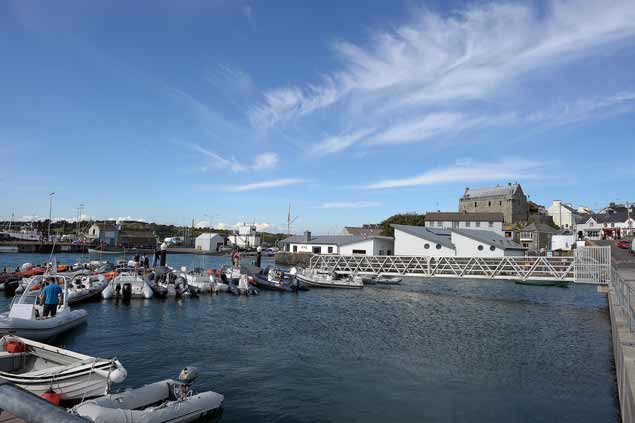 The landing pontoon and gangway at Baltimore Harbour conveniently located close to the Sailing Club Photo: Michael Chester
The landing pontoon and gangway at Baltimore Harbour conveniently located close to the Sailing Club Photo: Michael Chester
But it wasn't always that easy. As Afloat.ie reported back in 2013, all that previously existed in Baltimore was a temporary floating pontoon for visiting boats present only in the summer season. That pontoon was capable of taking for up to seven or eight boats and was used by a mix of cruising boats, ribs and local fishing boats, often rafting up in busy periods.
In February 2015, a new landing pontoon and gangway to aid boating visitors and aquatic tourism were installed.
Nearby, there are now also new facilities at Cape Clear Island and works at Schull Harbour will further extend the cruising range for RIBs and pleasure boats to explore the boating wonders of the West Cork coast.
Build it and they will come!
#RNLI - A busy Bank Holiday Sunday (3 June) for RNLI lifeboat callouts began just after 9am, when Baltimore RNLI was tasked to a yacht that ran aground upriver from the West Cork village.
The vessel, with two on board, got into difficulty while trying to navigate the River Ilen near Old Court. Conditions at the time were described as good but the tide was falling.
Baltimore’s inshore lifeboat, with helm John Kearney and crew members Ian Lynch and David Ryan, arrived on scene at 9.27am.
After assessing the situation and checking the area around the vessel for any further navigational hazards, a tow was established and the yacht was pulled clear.
There was no apparent damage to the yacht and no injuries to anyone on board, so they continued on their journey down the river and the lifeboat returned to station.
Later in the morning, Wicklow RNLI launched to a 13m fishing vessel that suffered engine failure off the Wicklow coast.
The all-weather lifeboat Annie Blaker, under the command of coxswain, Nick Keogh launched shortly before 11am and was alongside the stricken vessel 50 minutes later, near Bray Head.
Conditions on scene had a sea state slight, with a south-westerly Force 3 wind and poor visibility due to fog.
Two lifeboat crew members were transferred onto the fishing vessel to assist with establishing a towline and assess one of the three fishermen on board, who was found to have sustained an arm injury. He received first aid and casualty care from Carol Flahive and Alan Goucher as the vessel was towed back to Wicklow harbour.
The fishing vessel was brought safely alongside the South Quay in Wicklow at 2pm and the injured fisherman was handed into the care of an ambulance crew.
A third callout was at Lough Derg on the Shannon, where a cruiser with two on board had run aground at Tullabeg over lunchtime.
The Lough Derg lifeboat was on scene within minutes as the crew were already in the area on exercise.
Once established that the boat had no structural damage and the two people on board were fine, the vessel was towed into deeper water to allow its journey to continue.
“With the good weather continuing there are a lot more people on the water,” Lough Derg RNLI helm Owen Cavanagh said. “We would always advise to plan any water-based activity well in advance and if out on a boat to make proper preparations for the trip, including taking the correct equipment and keeping a close eye on the surroundings.”
#RNLI - Rosslare Harbour RNLI’s all-weather lifeboat launched late last night (Sunday 27 May) to assist a becalmed yacht with three crew onboard.
The 13m yacht, which was travelling south, was becalmed on a very still evening. Unable to continue and within busy shipping lanes off the Wexford coast, the yacht called for assistance.
Rosslare Harbour RNLI lifeboat quickly reached the yacht and it was brought back under tow to the shelter of Rosslare Europort.
Apart from poor visibility due to fog, sea conditions were calm.
Speaking after the callout, Jamie Ryan, Rosslare Harbour RNLI volunteer lifeboat press officer, said: “We would like to commend our crew for their great response late on a Sunday evening and also commend the experienced crew on the yacht for quickly calling for assistance when they encountered problems.”
Earlier, Baltimore RNLI launched on its third callout in as many days to assist a yacht which went aground on East Skeam Island yesterday afternoon.
The yacht, with two on board, had been dragged by its anchor dragged in a strong north-easterly Force 5 wind and ended up ashore on the West Cork island.
Arriving in scene seven minutes after launch, the Baltimore lifeboat crew established a tow to refloat the yacht and send it on its way to Schull.
On return to Baltimore harbour, the lifeboat crew then went to investigate a 16ft dory that had broken from its mooring and gone ashore on Sherkin Island.
No people were on board, so the lifeboat crew took an anchor from the vessel and dropped it offshore from the beach so that the rising tide and onshore winds wouldn’t drive the boat further ashore.
Baltimore Lifeboat In Two Friday Callouts To People In Difficulty On Passenger Vessels
#RNLI - Baltimore RNLI has praised the swift actions of one of its volunteer crew members in the rescue a man taken ill on a passenger vessel in West Cork yesterday afternoon (Friday 25 May).
In the first of two callouts yesterday, the all-weather lifeboat was requested to launch at 12.50pm following a report of man in difficulty on a small passenger vessel west of The Stags.
Weather conditions at the time were described as slightly choppy with a Force 3 easterly wind.
The skipper of the passenger vessel, a long-serving volunteer crew member with Baltimore RNLI, had immediately administered casualty care to the man when he started to show signs of being in difficulty, and the man was already in the recovery position as the lifeboat arrived minutes later.
Once on scene, the casualty was transferred onto the lifeboat where the crew continued to administer casualty care as he was brought back to Baltimore.
The man was then transferred into the care of paramedics and a waiting ambulance before he was brought to hospital for further treatment. Volunteer crew member Sean McCarthy provided assistance at Baltimore Lifeboat Station.
“All at Baltimore RNLI would like to wish this man a full and speedy recovery following his ordeal,” said Tom Bushe, Baltimore RNLI lifeboat operations manager.
“[The callout was] a fine example of how the RNLI’s lifesaving training can make a real difference and I would particularly like to praise the efforts of Micheal Cottrell, skipper of the small passenger vessel, who used his skills as a crew member to help bring this man to safety before the lifeboat arrived on scene.”
Baltimore RNLI has been called out for a second time today (Friday 25 May) to a separate incident to a woman who got into difficulty on a passenger vessel in West Cork.
Later in the afternoon, the volunteer lifeboat crew launched their all-weather lifeboat at 4.25pm following a request to provide a medevac for the woman about one mile southwest of the Kedge.
The casualty was transferred immediately to the lifeboat when it arrived on scene 10 minutes after launch. Casualty care was administered by the crew while the lifeboat made its way back to Baltimore lifeboat station.
Once at the station, casualty care was continued by the lifeboat crew until the HSE ambulance, a local GP and the Irish Coast Guard helicopter from Waterford, Rescue 117, arrived and took over care.
#RNLI - Baltimore RNLI carried out a medevac yesterday morning (Monday 21 May) from Cape Clear Island off the coast of West Cork.
The volunteer lifeboat crew were asked to launch their all-weather lifeboat following a request from the Irish Coast Guard at 7.53am to provide medical assistance and evacuation to a man living on the island.
The all-weather lifeboat arrived in Cape Clear at 8.25am and the casualty was transferred to the care of the volunteer crew onboard.
The lifeboat then returned to Baltimore lifeboat station at 8.55am and handed the casualty over to the care of HSE ambulance crew once they arrived at the station.
Conditions at sea during the shout were flat calm with a north-easterly Force 3 wind.
There were seven volunteer crew onboard the lifeboat: coxswain Aidan Bushe, mechanic Cathal Cottrell and crew members Brendan Cottrell, Micheal Cottrell, Jerry Smith, Emma Lupton and Don O’Donovan. Kieran Cotter provided shore crew assistance at the lifeboat house.
Speaking following the callout, Baltimore RNLI volunteer lifeboat press officer Kate Callanan said: “Baltimore lifeboat regularly provides medical assistance and transfers for people living, working or holidaying on the islands.
“This call is the third medical evacuation for Baltimore RNLI in the past two weeks.
“Always remember, if you find yourself at sea or on an island in need of medical assistance, call 999 or 112 and ask for the coastguard.”



























